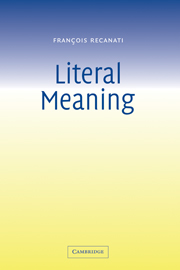Book contents
- Frontmatter
- Contents
- Acknowledgments
- Introduction
- 1 Two approaches to ‘what is said’
- 2 Primary pragmatic processes
- 3 Relevance-theoretic objections
- 4 The Syncretic View
- 5 Non-literal uses
- 6 From Literalism to Contextualism
- 7 Indexicalism and the Binding Fallacy
- 8 Circumstances of evaluation
- 9 Contextualism: how far can we go?
- Conclusion
- Bibliography
- Index
8 - Circumstances of evaluation
Published online by Cambridge University Press: 08 January 2010
- Frontmatter
- Contents
- Acknowledgments
- Introduction
- 1 Two approaches to ‘what is said’
- 2 Primary pragmatic processes
- 3 Relevance-theoretic objections
- 4 The Syncretic View
- 5 Non-literal uses
- 6 From Literalism to Contextualism
- 7 Indexicalism and the Binding Fallacy
- 8 Circumstances of evaluation
- 9 Contextualism: how far can we go?
- Conclusion
- Bibliography
- Index
Summary
In this book we have been concerned with the contribution context makes to truth-conditional content. How essential is that contribution, and how much controlled by linguistic conventions? These are two of the main questions we have dealt with, in an attempt to revive the debate between Literalism and Contextualism. In this chapter we will consider a fundamental dimension under which context contributes to truth-conditional content: the so-called ‘circumstance of evaluation’.
Truth-evaluation (or semantic evaluation more generally) requires not merely a content to evaluate, but also a ‘circumstance’ against which to evaluate that content. As Austin once put it, ‘it takes two to make a truth’. The circumstance of evaluation is not an aspect of the content to be evaluated, but an entity with respect to which that content is evaluated. Still, according to the theory of situations to be introduced in this chapter, the circumstance of evaluation is an aspect of content in a broader sense of ‘content’. And that aspect of content is irreducibly contextual.
Modality
The notion of circumstance of evaluation is familiar from modal logic. In modal logic, propositions are evaluated relative to ‘possible worlds’. The possible worlds are necessary to truth-evaluation, but they are not themselves represented in the propositions that we evaluate. Thus ‘I am French’ (said by me) is true, with respect to a world w, iff I am French in w; but the sentence ‘I am French’ only talks about me and the property of being French.
- Type
- Chapter
- Information
- Literal Meaning , pp. 115 - 130Publisher: Cambridge University PressPrint publication year: 2003



